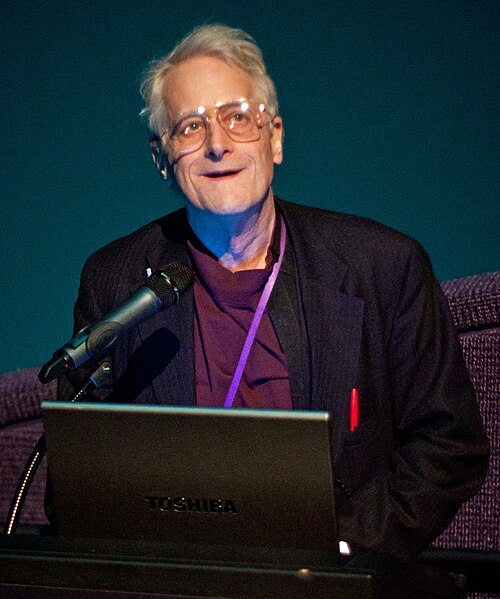He doesn’t always make it easy. He’ll put things in BOLD FULL CAPS. He likes gnomic utterances, especially when they’re uttered by others: “‘The reason is, and by rights ought to be, slave to the emotions’–Bertrand Russell.” [EDIT: The real source is David Hume: “Reason is and ought only to be the slave of the passions.” H/T Michael Thomas.] He never shies away from a huge generalization. With regard to curriculum, “There are no ‘subjects,'” and “There is no natural or necessary order of learning.” And although he speaks with great admiration of Doug Engelbart, to the point of reverence (I recently learned that Nelson actually cast Engelbart as his father in a short film–I kid you not), he also erupts with non-Engelbartian claims such as “I think that when the real media of the future arrive, the smallest child will know it right away (and perhaps first)…. When you can’t tear a teeny kid away from the computer screen, we’ll have gotten there.”
Of course we all know that an addiction to (insert favorite trivial Internet activity here) is not at all the same as the imperative “Motivate the user and let him loose in a wonderful place,” one of Ted Nelson’s most stirring admonitions. Not every online place is indeed wonderful, and not every teeny kid is glued to the display of a wonderful place on whatever screen we can’t tear him or her away from.
So yes, it’s not always easy to love Ted. But love him I do.
I love him the way I love the musician Pete Townshend, who once described himself this way:
“A beggar, a hypocrite, love reign o’er me.”
I love him the way I love the poet Walt Whitman, who in a relentlessly narcissistic poem titled Song of Myself nevertheless drew the whole world to him, writing “Do I contradict myself? Very well then, I contradict myself. I am large, I contain multitudes.”
I love him the way I love the poet Marianne Moore, who once in a fit of high dudgeon–perhaps–wrote these words about poetry itself:
I, too, dislike it: there are things that are important beyond all
this fiddle.
Reading it, however, with a perfect contempt for it, one
discovers in
it after all, a place for the genuine.
Hands that can grasp, eyes
that can dilate, hair that can rise
if it must, these things are important not because a
high-sounding interpretation can be put upon them but because
they are
useful.
I take it that the phrase “perfect contempt” has its own recursive resonance, after all. Obviously I am not alone in my love, either. No less a poet than former Poet Laureate Robert Pinsky (who wrote my favorite poem ever about television) has his own struggles with the poem, and his love for it (and Moore). Pinsky observes that “Moore likes to keep everything shifting and vibrating.” Yes indeed.
As does Ted. And through all of his dicta and dogmatic statements, his arm-waving and his frank anger, I love the shifts and vibrations. Most of all, I love his love, which mingles perfect contempt and unswerving commitment in a way that finally, for me at least, leads to the light.
When I read Ted Nelson, whether I’m smarting or disagreeing or exulting aloud at the richness of his insights and the intensity of his expression, I do feel that I am in a wonderful place–and motivated, oh yes.
For that, I am grateful.


Beautifully, passionately, enlighteningly said, GC. Thanks for sharing. Of course, now I have to go read more about the guy … and I really don’t have time for yet another digression.